Where Your Confidence Lies, Based On Your Myers-Briggs® Personality Type
I recently saw an article online that made a list of the most to least confident personality types. Online you’ll see many articles saying that one type “is” something or another, and another type “isn’t.” But the more I’ve studied personalities as an MBTI® practitioner, the more I’ve realized it’s not that black and white. We are all confident about some things and less confident about others. And even the things we lack confidence in can be learned and mastered eventually. Today I’m taking a deeper look at confidence and how it shows up in the 16 personality types.
Not sure what your personality type is? Take our personality questionnaire here. Or you can take the official MBTI® here.

Table of contents
Estimated reading time: 23 minutes
Where Your Confidence Lies, Based On Your Myers-Briggs® Personality Type
The ENFP
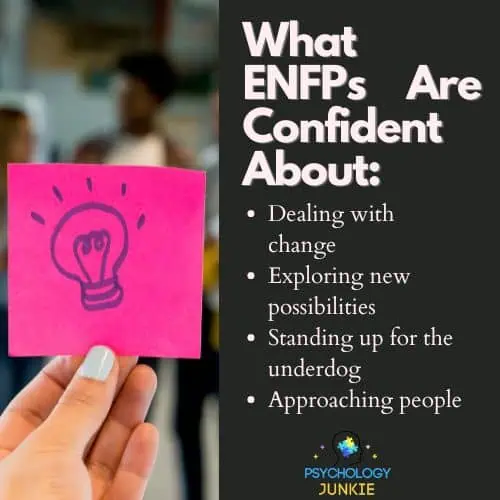
ENFPs are the ultimate adventurers, mixing a love for excitement with the ability to roll with the punches. They’re not just okay with the unknown; they dive into it with excitement. In fact, staying stable and consistent is way more terrifying for an ENFP than dealing with a little change or risk. For them, a bit of uncertainty isn’t scary—it’s thrilling! They’re all about discovering new paths and possibilities, always with an eye on staying true to what they believe in. Their curiosity isn’t just skin deep; it’s what gets them out of bed, eager to explore and break new ground.
When it comes to making friends and building connections, ENFPs are hard to match. Of course, there are ENFPs who struggle with social anxiety, but many ENFPs find walking up and instigating conversations with people exciting and fun rather than terrifying. They can strike up a conversation with just about anyone, and they genuinely love digging deeper into people’s stories and dreams. They see the wide kaleidoscope of personalities not as a challenge but as something that makes life more interesting and diverse. ENFPs stand tall for what they believe in, too. They’re not the type to back down or smooth things over if it goes against their values. Sure, they might choose their battles, especially if they lean towards being more peace-loving, but they’re rarely afraid to stand up for what’s right.
Find out more about ENFPs: 24 Signs That You’re an ENFP, the Visionary Personality Type
The ENTP
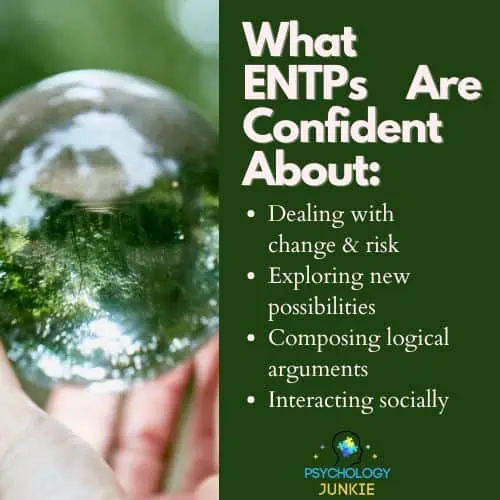
ENTPs thrive on the challenge of dissecting complex theories and beliefs. They’re not afraid of a good argument, but see debates as opportunities to explore truths and push boundaries. For ENTPs, an engaging debate serves not only as a battlefield for their intellect but as a playground for their expansive curiosity.
And then let’s talk about change. Lots of personality types shy away from change, fearing the difficulties that may come with the unknown. But ENTPs are actually more afraid of being stuck in a routine or a consistent, predictable life. They’re not just comfortable with change; they seek it, driven by a constant desire for innovation and the thrill of venturing into the unknown.
With a keen interest in a wide array of topics, ENTPs are never content to focus on just one thing at a time. Their minds are always racing ahead, dreaming up the next big idea or breakthrough. This quality makes them exceptionally adaptive, ready to pivot and tackle new challenges with a blend of creativity and strategic thinking. They’re fearless in making changes, whether it’s in their personal life, within their work, or when exploring new technological advancements. Competition fuels them, not just for the sake of winning, but as a means to test their capabilities and push their limits. For ENTPs, life is an endless quest for knowledge, growth, and the next big adventure.
Find out more about ENTPs: The Top 7 Gift Ideas for ENTPs
The INFP
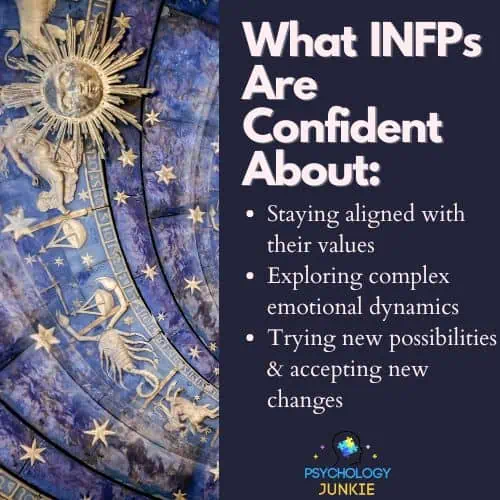
To say that INFPs are comfortable treading where others might not is an understatement – they’re the ones at gatherings who skip the small talk, reaching straight for the soulful, sometimes taboo topics. They explore beliefs, convictions, and the complex worlds of human emotion and thought with an insatiable curiosity. They are the ones who, while understanding and respecting a wide array of opinions and beliefs, stay unwaveringly true to their own deeply held values.
And a solitary, quiet life doesn’t scare an INFP away either. These dreamers cherish their solitude as much as they do meaningful connections. Alone, they’re not just okay; they thrive, sifting through their rich inner worlds or indulging in creative pursuits that bring their imagination to life. They’re those rare souls who can sit with ambiguity, not rushing to black-and-white labels or easy answers, but rather finding joy in the messiness of real life, the gray areas where most of life’s truth hides.
Despite a soft spot for routines and traditions that anchor them, INFPs are adventurers at heart, drawn to the new, the unknown, the unheard. Yet, their adventures are not always about outward exploration. Many a time, it’s an inward quest, bravely confronting their own shadows and lightness. I’ve known so many INFPs who use humor as a way to bridge differences between people, who speak of their own vulnerabilities and flaws with confidence, knowing that their bravery in revealing themselves can help others to learn and grow as well.
INFPs remind us that at the heart of true connection lies the courage to be utterly and authentically oneself, to share not just our light but our darkness, too.
Discover more about INFPs: 10 Ways to Spark Your Creativity as an INFP
The INTP

Where most see a barrage of data and convoluted theories, INTPs see a playground. INTPs don’t just handle the unknown; they welcome it with a cup of coffee, ready to pull an all-nighter unraveling the universe’s secrets. Talk about theories that make most people’s heads spin? That’s their Thursday morning warm-up.
I personally can find my mind going into freeze mode when a lot of data and theories are being thrown around in an argument at rapid speed. A lot of people do. But INTPs can jump from one theory to another, bringing data, logic, and intellectual insight into the play.
What really gets an INTP pumped isn’t just the pursuit of knowledge for knowledge’s sake but the joy of sharing that eureka moment when everything clicks. They’re surprisingly patient when explaining things that many people find confusing, often willing to explore others’ perspectives, as long as there’s a strand of logic to grasp onto. They’re not just thinkers; they’re teachers, philosophers, the perpetual students of life who remind us that the world isn’t black and white but an infinite spectrum of possibilities. In a world hungry for quick fixes and easy answers, INTPs challenge us to look deeper, think harder, and appreciate the beauty in complexity.
Find out more about INTPs: The Childhood Struggles of INTPs
The ENFJ

For the ENFJ, every person they meet is a story waiting to be understood and a relationship waiting to be built. They excel in new experiences and thrive on change, viewing each shift in the landscape of their lives as an opportunity to learn and grow. It’s their exceptional communication skills that set ENFJs apart, allowing them to craft deep, meaningful connections, even with those whose experiences and beliefs may be very different from their own. They approach communication with an open heart and mind, radiating warmth and sincerity, making others feel genuinely heard and valued.
ENFJs are not just comfortable but energized by the complexity of human nature, showing remarkable patience and understanding when navigating the often messy world of people’s emotions and beliefs. They’re the ones you’ll find in the thick of conflict, not taking sides but offering a bridge of empathy and understanding, guiding others towards a resolution that respects all perspectives. Their skill in hearing out different views, even in the midst of heated discord, while maintaining respect and regard for each individual’s worth, is nothing short of inspiring. My friend Denzel Mensah is an ENFJ type profiler and life coach, and he never fails to amaze me with his empathy, warmth, and ability to see many different perspectives with clarity and understanding.
For the ENFJ, their confidence shines brightest when they’re helping others to tackle rare or unusual issues, never flinching away from the challenges that come with complex human emotions and unusual life situations. ENFJs have this unique ability to bring light to the darkest of places, making people feel less alone in their struggles. In a world that often seems divided by those differences, ENFJs remind us that at the core, we all seek to be understood, respected, and loved.
The ENTJ

The ENTJ personality type is a force to be reckoned with, embodying the spirit of leadership and an unquenchable thirst for achievement. For ENTJs, life is a series of challenges to be overcome and milestones to be achieved. They thrive under pressure, where others might falter, making them exceptional leaders in both their professional and personal lives. ENTJs have a unique ability to cut through the noise and confusion, focusing laser-like on their objectives and devising strategic plans to achieve them. Their decisiveness and quick thinking allow them to excel in fast-paced situations where others might feel overwhelmed.
As an example, last year at a Personality Hacker conference, we had a complicated group conflict game (I don’t know what else to call it), with complicated themes, strategies, and tactics involved. Many of us were confused by the rapid pace of the game and the unclear rules and expectations, while the ENTJs were simply taking charge, making up (or breaking) their own rules, and getting people started on winning.
Leadership for ENTJs isn’t just about setting directions; it’s about inspiring their teams and ensuring that everyone knows their role in achieving the collective goal. They are not afraid to delegate tasks and take charge, but they also know how to paint a picture of what everyone is working for, helping them feel truly motivated.
ENTJs are not just focused on the end goal but also on the process of achieving it. They enjoy the thrill of competition, not out of a desire to best others, but as a means to test their abilities and drive improvement. Through their ambitious nature, strategic thinking, and charismatic leadership, ENTJs show us that with the right mindset, any challenge can be transformed into an opportunity for success. They remind us that leadership is not just about where you are going but how you get there, inspiring those around them to strive for excellence and achieve their full potential.
The INFJ

For the INFJ, depth and understanding are not just preferences; they are necessities. These individuals stand out for their profound capacity to explore and engage with complex existential theories and emotional intricacies that many find scary or daunting. INFJs are drawn to the meaningful over the entertaining, preferring to unravel the mysteries of the human psyche and the universe rather than skate on the surface of shallow distractions. Their confidence lies not in the loud proclamation of their beliefs but in the quiet assurance with which they explore these profound concepts, fearlessly diving into topics that others may shy away from because they’re too complex or abstract.
INFJs possess a unique blend of empathy and bravery, enabling them to confront and tackle the emotional issues of others with a sensitivity and understanding that is rare. They have an incredible ability to find patterns and meanings in the lives of those around them, often shining a light on insights that were previously overlooked. This makes them invaluable friends and confidants, offering perspectives that enrich and deepen the understanding of those they interact with.
Change, for INFJs, is a double-edged sword. While they may not actively seek it in the way that some personality types do, they recognize and embrace it as an opportunity for personal growth and new insights. This acceptance allows them to remain fluid and adaptable, navigating life’s transitions with grace and using them as tools for deepening their understanding of themselves and the world around them.
Discover more about INFJs: 24 Signs You’re an INFJ, the Mystic Personality Type
The INTJ

For the INTJ, life is an endless frontier of possibilities waiting to be explored and understood. INTJs are strategic and visionary, capable of spotting solutions and pathways that others might deem unreachable or too complex to even bother thinking about.
For INTJs, there is a huge focus on competence and mastery. They demand nothing short of excellence from themselves, and aren’t content with surface-level understanding or half-hearted efforts. Instead, they push themselves to the pinnacle of their abilities, often achieving what others might dismiss as “impossible.” This relentless pursuit of growth and knowledge makes them formidable in any arena they choose to engage with.
Friedrich Nietzsche, a rumored INTJ, famously said, “Active, successful natures shun the dictum ‘know thyself’ and follow the commandment: ‘Will thyself.'” And willing thyself is something that INTJs are exceptionally good at.
In the dynamics of conflict, INTJs remain steadfast to their principles, willing to stand alone if necessary. Their independence is a strength, enabling them to take paths less travelled and make decisions that are uninfluenced by passing trends or the court of public opinion.
Yet, despite their fierce autonomy, INTJs are profoundly insightful about human nature and the complexities of the world. Their contributions are not made in a vacuum; they understand the broader implications of their actions and ideas, aiming to push society forward, one innovation at a time. In a world that often values conformity and immediate gratification, INTJs remind us of the power of individual thought, the importance of pursuing one’s convictions, and the incredible progress that can be made when we dare to think differently and challenge the status quo.
Find out more about INTJs: Your INTJ Personality Type and Your Enneagram Type
The ESFP

Two of my closest friends are ESFPs, and one of the things that continually draws me towards this type is their bravery in taking on new challenges, embracing adventure, and being real. It doesn’t matter how old they are, they have no problem embracing their inner child publicly. They haven’t lost their heart for fun, excitement, and spontaneity, and it’s wildly appealing.
Their confidence doesn’t just lie in their ability to approach people with authenticity; it’s deeply rooted in their unwavering stand for their beliefs and values. ESFPs have a unique gift of not only generating rapport but truly hearing out and respecting others’ beliefs and values, even those that might puzzle or be dismissed by others.
Their spark of spontaneity and readiness to jump into action makes ESFPs natural mood lifters. They’re the ones who stand up, stir things up, and ensure everyone around is having a good time, yet they’re never just about the fun. They possess deep values that they stand up for, displaying a courage that inspires others to also stand up for what they believe in. It’s this blend of light-heartedness and depth that enables ESFPs to make a really deep impact wherever they go.
Discover more about ESFPs: ESFP Cognitive Function Guide
The ESTP

I’m married to an ESTP who is most likely going to read only this section in my article, so I better make it good (Hey, Daniel!)
Known for their love of excitement and competition, ESTPs are the quintessential action-takers, always ready to jump headfirst into new ventures or solve problems as they arise. Their confidence shines brightest in situations that demand quick thinking and decisiveness. In a crisis, an ESTP often shows up like a superhero sans the flowing cape, swiftly navigating through chaos with a blend of practicality and ingenuity that many admire but few can replicate.
ESTPs thrive on variety and the thrill of the moment, embodying the phrase “seize the day.” This zest for life, combined with their fearless approach to risk, makes them unparalleled in grasping opportunities that others might shy away from. Socially savvy, they maneuver through relationships with ease, often taking the lead in guiding conversations and activities. Their ability to connect with people on a genuine level is unmatched, making them both respected leaders and fast friends.
Their adaptability in the face of change is not just a skill but a lifestyle. ESTPs relish the dynamic flux of life, using their sharp wit and keen observation skills to respond to new information and situations with a remarkable blend of confidence and competence. This makes them not just survivors but trailblazers, eager to explore uncharted territories and inspire those around them to embrace the beauty of the moment, the thrill of the challenge, and the joy of life’s endless possibilities.
Want to know more about ESTPs? Read Your ESTP Cognitive Function Guide
The ISFP

ISFPs are the individuals who not only march to the beat of their own drum but also made the drum themselves, and probably decorated it with their own art as well. ISFPs strive to be unapologetically themselves, reveling in the freedom that comes from not being tethered to societal expectations or norms.
ISFPs are the champions of diversity, not just accepting but genuinely celebrating the quirks and idiosyncrasies that make each of us who we are. Fearless in the face of the unconventional, they’re the ones who remind us that it’s in our differences where our true strengths lie.
Change is not a force to resist for an ISFP but an old friend to embrace. They understand that growth and comfort do not coexist, which is why they’re always seeking new experiences, even if it means navigating the complex maze of emotions that many prefer to avoid. Yet, in this vulnerability, ISFPs find their power, showing us that true courage is not the absence of fear but the determination to face it head-on.
ISFPs teach us that life’s beauty comes from the freedom to be our true selves, to explore the depth of our feelings, and to appreciate the kaleidoscope of human experience. In a world that often rushes to judgment, ISFPs stand as a testament to the power of understanding, empathy, and, most importantly, the strength found in being true to one’s values and personal beliefs.
Find out more about ISFPs: The Childhood Struggles of ISFPs
The ISTP

Walking into the unknown with a calm assurance and a keen eye, the ISTP thrives in environments that would leave many feeling out of their depth. Known for their dynamic adaptability and clear-headed practicality, ISTPs face life’s challenges with a cool demeanor and an unruffled spirit. Their approach to problem-solving is rooted in realism, logic, and competence. The unanticipated nature of change, which might unsettle others, is where ISTPs truly shine, greeting the new and the unforeseen with open arms and a ready mind.
In the midst of chaos, where others might succumb to pressure, ISTPs remain the eye of the storm—calm, collected, and remarkably clear-thinking. Their ability to remain unfazed, analyzing situations with a dispassionate logic, makes them impressive in crisis scenarios. They live for the thrill of firsthand experience, relying on their robust logical framework and their reservoir of knowledge to guide them through.
Like their INTP type-cousins, ISTPs are also not afraid of debate, often seeking out the opportunity to challenge existing ideas and systems. This innate curiosity and skepticism also extends to their own beliefs; they’re always open to reassessing what they know and adapting it as necessary. Some people shy away from questioning their own beliefs, finding comfort in tradition or what they’ve always believed. ISTPs are not like this; questioning and revising their worldview and beliefs as they get new information.
ISTPs embody the ethos of living fearlessly, not by dismissing the unknown, but by engaging with it, learning from it, and ultimately mastering it.
Learn more about ISTPs: 5 Reasons Why You’ll Need an ISTP in a Zombie Apocalypse
The ESFJ

ESFJs have confidence when it comes to dealing with people and all the different issues they experience in the world. ESFJs at their best are always ready to extend a hand or a listening ear to those in need. Their bravery is about having unyielding courage to confront the world’s harsher realities with empathy and a resolve to make a difference.
In places where hope seems dim, I’ve seen ESFJs do some of their best work. I have known several ESFJs who have volunteered in homeless shelters and humane societies. They are unphased by the chaos or the mess, they see through the surface, recognizing the potential and worth in every soul and situation. I’ve seen them comforting people who’ve lived through harrowing ordeals, bathe dogs that were filthy and covered in fleas, and offer practical warmth, support, and guidance.
ESFJs don’t just want to create harmony fro harmony’s sake. Their actions come from a deep-seated belief in the good of humanity and the power of community support. It’s not just about offering help; it’s about bridging gaps, knitting a tighter community fabric, and nurturing an environment where everyone feels at home.
The ESFJ confidence is about being a spark of light in someone’s darkest times, holding the banner of humanity high, and leading with love and determination. They remind us that bravery isn’t always about facing danger head-on but sometimes, it’s about showing up, day after day, ready to support, heal, and uplift those around us.
Find out more about ESFJs: 5 Big Differences Between ENFJs and ESFJs
The ESTJ

Life is chaotic and messy, there’s no denying that. And sometimes we need someone who can create a sense of calm and competency in the storm. Enter the ESTJ. ESTJs confront challenges head-on, wielding their eye for organization, structure, and effectiveness. Their bravery is not just in tackling obstacles but in their willingness to take charge, guiding those around them towards cohesive plans and actionable solutions. ESTJs possess a remarkable ability to sift through disorder, identifying priorities and strategizing on the fly to restore stability and order.
With a vision that cuts through confusion, ESTJs are adept at mapping out goals and utilizing resources efficiently to achieve the desired outcomes. In times of tumult, they emerge as the leaders who can create a sense of stability amidst the storm, making swift decisions that drive progress and ensure that they get the goals they’re aiming for.
The thing about being a leader is it invites in scrutiny and criticism. But ESTJs are not deterred by criticism or the pressures that come with being at the helm. They are propelled by a genuine commitment to guiding others, delegating tasks effectively, and moving groups forward towards collective success.
Discover more about ESTJs: A Look at the ESTJ Leader
The ISFJ

Known for their meticulous attention to detail, ISFJs create a world filled with stability, calm, and tranquility. They’re confident in their ability to handle the details of life; the details that others tend to overlook or balk at. These individuals know that the devil is in the details, and that it’s the small things that add up and give life meaning and direction.
Along with their proficiency with details, ISFJs are confident in their capacity to read emotions and respond to the needs of others. Whether it’s remembering a friend’s favorite comfort food during tough times or intuiting the exact words someone needs to hear, ISFJs have a rare gift for transforming empathy into action. This practical wisdom extends beyond the immediate, drawing from a rich reservoir of memories and past experiences. For ISFJs, history is not just a series of events, but a wellspring of insight, solutions, and timeless wisdom. They are confident that the answers to many of today’s challenges can be found by looking to the learnings of the past.
ISFJs are often the quiet heroes among us, creating harmony by ensuring the wheels of daily life run smoothly and that the emotional needs of their communities are met with understanding and compassion. They remind us that true leadership often shines brightest not in the limelight, but in the careful, consistent acts of support and kindness that make the world a more stable and comforting place for everyone.
Discover more about ISFJs: 24 Signs That You’re an ISFJ, the Protector Personality Type
The ISTJ
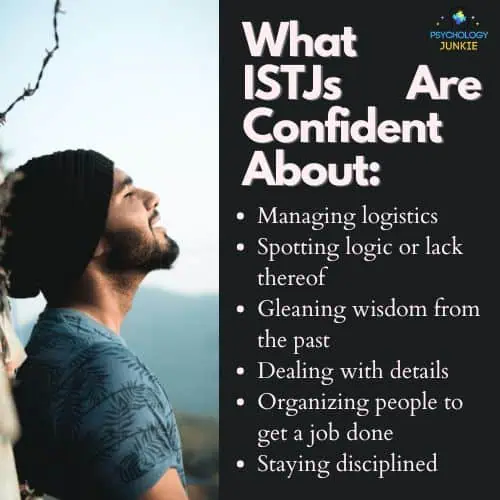
ISTJs stand out for their meticulous focus and dogged determination. Confident in their command of details, they can take on tasks that other types run away from because the details seem overwhelming. I’ve seen other types go nearly into hysterics about having to organize a bunch of confusing details (tax season, anyone?) and ISTJs calmly guide them through the process.
ISTJs also have confidence about lessons from the past. They regard the past not merely as history but as a rich repository of lessons to guide present and future actions. ISTJs are the epitome of methodical planning, organizing with an efficiency that transforms chaos into order, making the world a more predictable, and thereby, a more manageable place.
What sets ISTJs apart is their unmatched ability to postpone immediate gratification for the sake of long-term achievement. They are not lured by fleeting pleasures when there’s work to be done, they’ve got to stay disciplined to achieve their goals. For them, the path to true contentment is paved with steady effort, careful planning, and an unwavering commitment to duty and responsibility. This takes confidence and discipline; trusting the end result instead of getting distracted by fleeting distractions.
ISTJs embody the principle that genuine satisfaction comes not from the pursuit of immediate pleasure but through the diligent, painstaking effort to build something enduring. This profound understanding of the value of perseverance and commitment marks the ISTJ’s unique brand of confidence.
Find out more about ISTJs: 10 Signs of an Unhealthy ISTJ
What Are Your Thoughts?
What makes you feel the most confident? Do you have any other insights, experiences, or tips to share? Let us know in the comments!
Find out more about your personality type in our eBooks, Discovering You: Unlocking the Power of Personality Type, The INFJ – Understanding the Mystic, The INTJ – Understanding the Strategist, and The INFP – Understanding the Dreamer. You can also connect with me via Facebook, Instagram, or Twitter!

Subscribe to Our Newsletter

Want to discover more about personality type? Get the inside scoop with Susan Storm on all things typological, along with special subscriber freebies, and discounts on new eBooks and courses! Join our newsletter today!


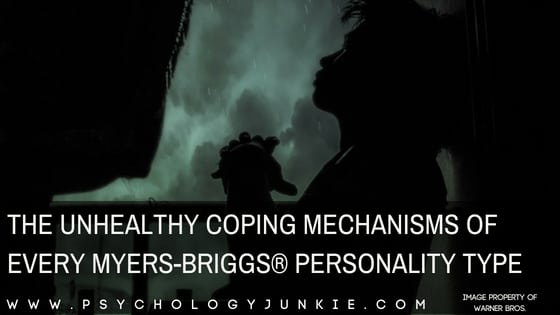



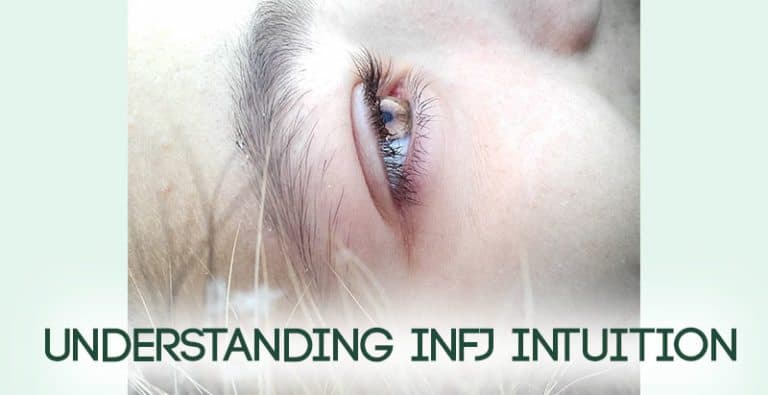
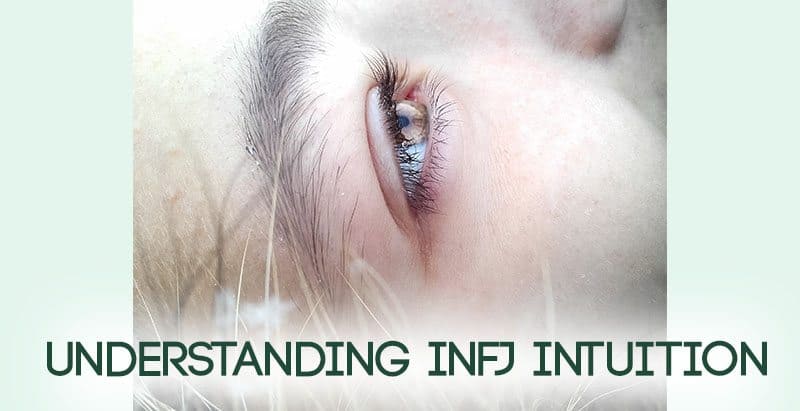


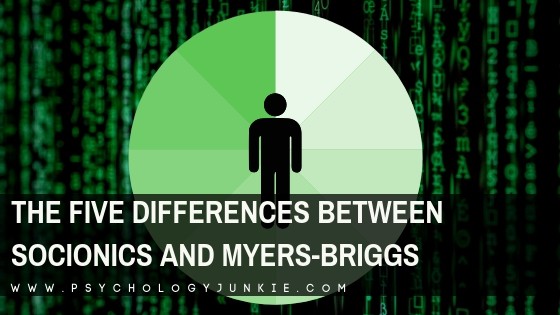
ISTJ description matches me “to a ‘T'” (whatever that means!)
I think the general concept of “confidence” is in a social context, e.g., at parties, board meetings or confrontations; but you make a good point that there are other types of confidence. I may not understand a math equation at first but I’m not too intimidated to dissect and maybe retro-engineer it to suit my purposes. I also don’t mind trying something new and unconventional if it makes sense to me and there are gains to be made. And I’m comfortable doing things alone, without the need for someone else there to provide input or be a sounding board, although I may well discuss the experience with someone later.